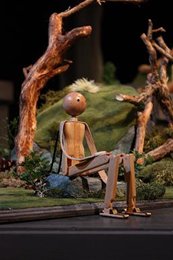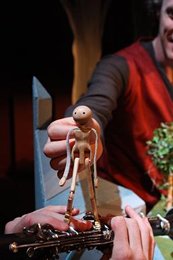Jody O’Neill transforms a universal story into a morality tale for children in this captivating piece of theatre, which is told through the use of wooden puppets and live music. The play’s hero is Walking Man, destined from childhood to follow in the footsteps of his father, and to work at the best job at the top floor of the tallest building in the whole city. Walking Man’s father had no time to stop in his pursuit of success; nor does Walking Man, the woman he marries, or the baby they produce. Everyone must keep going, in case they fall behind. “I have to keep moving,” chants Walking Man, “if I want to get ahead.”
 It is, of course, a modern-day allegory, pertinent to the way in which we, in the western world, have chosen to live our lives. Aimed at 6-9 year olds, the story follows Walking Man as, one day, he walks out of the city and into the country. There he comes across a relaxed mountain, a lazy fox, and finally, his own shadow, all of which persuade him to finally sit down, take a rest, and drink in the wonder of the outside world.
It is, of course, a modern-day allegory, pertinent to the way in which we, in the western world, have chosen to live our lives. Aimed at 6-9 year olds, the story follows Walking Man as, one day, he walks out of the city and into the country. There he comes across a relaxed mountain, a lazy fox, and finally, his own shadow, all of which persuade him to finally sit down, take a rest, and drink in the wonder of the outside world.
There is nothing particularly new here: this is an age-old story. Nonetheless, the Graffiti production employs enough subtlety and sophistication to both eschew sentimentality and to create a production of magic and wonder.
Walking Man and his world are created in miniature: designer Olan Wrynn has shaped the man and his family as tiny wooden puppets, while the blue/grey city in which they live is a beautifully-constructed model set (again designed by Wrynn) that later transforms into a lush green country space.
 Around the set move two adults: actor Damian Punch, who tells Walking Man’s story with humour and grace, and musician Dylan Gully, who hauntingly plays a specially-composed score throughout. The small space – the theatre accommodated around 20 audience members – allowed for a kind of hushed intimacy on the afternoon I watched the production, and Síle Ní Bhroin’s direction encouraged Punch and Gully to acknowledge both each other and the audience as the story unfolded.
Around the set move two adults: actor Damian Punch, who tells Walking Man’s story with humour and grace, and musician Dylan Gully, who hauntingly plays a specially-composed score throughout. The small space – the theatre accommodated around 20 audience members – allowed for a kind of hushed intimacy on the afternoon I watched the production, and Síle Ní Bhroin’s direction encouraged Punch and Gully to acknowledge both each other and the audience as the story unfolded.
It’s a joy to watch these kind of shows: theatre for children that takes itself seriously but employs a deft, light touch in so doing. The production – and O’Neill’s writing – is neither patronising nor dogmatic, but strikes a balance that indicates a respect for the young minds that will be watching it. There have been recent suggestions, in the media, that Irish society’s current crisis has its roots, among other things, in a reluctance to encourage its people to think for themselves. This kind of show, which offers so much to young – and maybe not so young – audiences, can only encourage such expansion-building exercises.
Rachel Andrews is a writer and journalist, based in Cork.